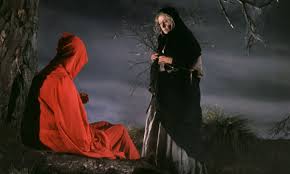Hollywood has people who think big, talk big, spend big. Budgets soar.
But then there was Roger Corman, who died last month at 98. He made kinda-good movies on really awful budgets. Now they’re featured in three Wednesday marathons on Turner Classic Movies.
Wedged into 28 hours on July 3, 10 and 17 will be 18 movies – some of them scary (including “Masque of the Red Death,” shown here) some of them frantic, none of them expensive.
Corman’s cost-cutting was legendary, including one story he confirmed: When he was filming a scene for the original “Little Shop of Horrors” (which airs at 12:15 a.m. in the July 3 marathon), the dental chair collapsed. The set people said it would take a half-hour to fix. That was too much time to waste, he decided; the collapse stayed in the film.
Often, Corman sounds like a fiscal genius. Then again, “Little Shop” was one of the films for which he saved a smidgen by not getting a copyright. As a result, he got nothing from the popular musical movie and stage show.
Dick Miller (an actor in many Corman films) explained to writer Beverly Gray that Corman’s theory was basic: “This movie is going to play in a couple of theaters for a month or two, and then it’s garbage.”
Except his movies were rarely garbage. His horror films always draw interest, especially his nine Edgar Allan Poe ones. His “Little Shop” is eternal. His “The Wild Angels” – which closes the July 10 marathon at 4:15 a.m. — has sharp, hand-held filming with a great Mike Curb score.
And his impact went further. The July 17 marathon has micro-budget Corman productions directed by Martin Scorsese, Francis Coppola, Peter Bogdanovich, Jonathan Demme and Joe Dante. Combined, those men have had 34 Oscar nominations and seven wins.
All started with Corman; so did James Cameron, Ron Howard and Carl Franklin, who told Gray: “He’s the best friend that a new filmmaker has.”
Gray was Corman’s assistant for eight years, before becoming a college faculty member, a free-lance journalist and the author of “Roger Corman” (Renaissance Books, 2000). She heard about his earlier years.
Back in 1957, a typical movie budget was near $2 million and “Ben Hur” was preparing to spend $15 million. Corman was given only $65,000 for each completed film, with the outside possibility of more later.
“His strategy was to come in under $65,000 per film,” she wrote. “(But) he would plan every third of fourth feature to be … below $30,000.”
That required extremes. One Corman movie might borrow things – a set, a few days of an actor’s contract, even a whole scene – from another. A writer complained that, at $200 for a full script, he got less than anyone else on the movie; Corman’s solution was to also give him an acting role.
To create his own sound stages, Corman bought a lumber-company building and lot. “For years,” Gray wrote, “the ‘Hammond Lumber’ sign remained in place, because Corman balked at paying for its removal.”
All of this might suggest a cliché movie mogul, chomping on a cigar while barking orders. Corman was the opposite. Elegant and educated, he was a Stanford grad. Like his father, he had an engineering degree; unlike his dad, he quit his only engineering job after three days.
Corman had a rich speaking voice and a professional manner. In occasional acting roles, he was a doctor, a dean, a district attorney; he was a congressman, a senator and (in “Silence of the Lambs”) the FBI director.
He had an upscale feel and downscale habits, Gray wrote. “Roger prides himself in wearing the same nondescript clothing for decades.”
He made cheap films, but not tacky one. “Roger specialized in elevating exploitation,” producer Thom Mount told Gray.
Corman filled his small staff with people from the Ivy League, Stanford and beyond. When John Sayles came there to seek script work, he was surprised that the script supervisor had already read his novel; she was an Oxford grad.
(Sayles wrote Corman’s “Piranha” and “Battle Beyond the Stars,” before becoming a top indie-filmmaker with two Oscar nominations,)
Corman was frugal, but benevolent, Gerry Molyneaux wrote in “John Sayles” (Renaissance, 2000). “The studio invited its writers to take liberties with the genre at hand, adding lighter touches and social commentary.”
But he expected a lot. In his memoir (1999, DeCapo), Corman described Cameron’s backstage work on “Battle Beyond the Stars” and other films. “I don’t think I ever saw Jim walk, He was always running ….Jim functioned as a model builder, effects cameraman and art director, all on the same shoot.”
That was Corman’s kind of guy, doing everything and doing it quickly. Cameron would move up to “Titanic” and “Avatar.” Corman would stick with cheap films and promising young direct0rs. He won an honorary Academy Award “for his rich engendering of films and filmmakers.” And now his movies – low in budget, high in quirky appeal – fill three cable marathons.
Here is the schedule for the Wednesday marathons on Turner Classic Movies, all times ET. Roger Corman directed the movies running the first two weeks; for the ones in the third, he produced with young proteges directing.
–JULY 3: “X: The Man With X-Ray Eyes” (1963), 8 p.m.; “A Bucket of Blood” (1959), 9:30; “The Wasp Woman” (1959), 10:45; “The Little Shop of Horrors” (1960), 12:15 a.m.; “Creature From the Haunted Sea” (1961), 1:45 a.m.; “Atlas” (1960), 3 a.m.; “Tower of London” (1963), 4:30 a.m.
— JULY 10: “House of Usher” (1960), 8 p.m.; “The Pit and the Pendulum” (1961), 9:30; “The Raven” (1963), 11; “The Masque of the Red Death” (1964), 12:45 a.m.; “Bloody Mama” (1970), 2:30; “The Wild Angels” (1966), 4:15 a.m.
— JULY 17: :”Boxcar Bertha” (1972, Martin Scorsese), 8 p.m.;”Targets” (1968, Peter Bogdanovich); “Dementia 13” (1963, Francis Coppola), 11:30; “Caged Heat” (1974, Jonathan Demme), 1 a.m.; “Piranha” (1978, Joe Dante), 2:30 a.m.
